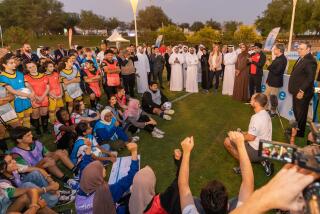High Life. A WEEKLY FORUM FOR HIGH SCHOOL STUDENTS : Whole World in Their Hands : International Negotiations Project Gives Students a Taste of the U.N. in Action
- Share via
WHITTIER — Perhaps the byline should read “Paco Cantante” ( cantante means “singer” in Spanish), for that’s how the entire world has known me the past two months.
Along with 20 other Fullerton High School juniors, I recently participated in the International Negotiations Project, a United Nations-type simulation affiliated with Whittier College.
Fifteen Western schools, including ones in Wyoming and Arizona, participated--that’s about 300 students. The other Orange County school involved was Connelly High of Anaheim.
The INP was begun four years ago by University of Maryland government and politics professor Jonathan Wilkenfeld, through funding by the U.S. Institute of Peace.
The primary purpose of the project was to let high school students actively participate in the decision-making processes countries go through during negotiations with other countries, said Jeff Sherwood, who teaches the International Baccalaureate American history class at Fullerton and is the school’s INP adviser.
Just as in real-life negotiations, there were no clear-cut winners.
“The ultimate goal was world peace,” said Sherwood, who added that he got his students involved in INP “because it fit nicely into making social science more international for the IB program.”
“(INP) allows students to experience as close to the reality of negotiating as you can get to the real world.”
Each participating school represented a separate nation, with Fullerton becoming Mexico.
All of the day’s global concerns and issues were integrated into the simulation by former Wilkenfeld student Joyce Kaufman, a professor at Whittier College who brought the project to the West Coast.
Issues ranged from the breakup of the Soviet Union to civil unrest in Angola.
Each country was broken down into four subgroups of its choice. I was a member of South/South, a trade coalition of third-world countries. Fullerton’s other subgroups were Human Rights, Global Health and the Environment.
After spending two weeks researching Mexico, the South/South group presented its policy statements--primarily one in favor of a North American Free Trade Agreement--to our fellow teammates.
Despite objections from the Environment subgroup (NAFTA would result in an increased number of factories), we adopted the motto of “Viva Mexico! Viva NAFTA!” and were ready to begin communicating with other countries.
There were three types of communication built into the INP program. Using a computer and modem, we sent daily letters to other countries. We also participated in two on-line conferences, during which groups from all the countries discussed issues and made proposals via computer. And finally, last month, 200 of the countries’ delegates met at Whittier College for the only face-to-face negotiations.
Because the South/South subgroup spent the day trying to formulate bilateral and multilateral trade agreements with all the participating countries, it was probably the most stress-provoking.
We took the rules to the limit and probably over the limit. Unbeknownst to any other country, we integrated intelligence operations into the INP, and it didn’t take us long to discover India’s password. We were able to log onto the computer as India and send messages to the rest of the world that would ultimately benefit Mexico.
We managed to engineer the first successful trade of the simulation with South Africa, which angered the members of Human Rights.
The three main topics of the Environment group were carbon dioxide emissions, alternative methods of power and the sharing of nuclear technology. However, at the face-to-face negotiations, the subgroup’s conference was uneventful as countries spent too much time arguing, according to Karen Hill, 16, of Fullerton.
“We spent a lot of time bickering and not getting anything done.” said Hill, adding that she did learn “patience.”
“You had to wait forever (to be called on at conference),” she said, “and subjects changed really quickly.”
Stalled negotiations also marred the Health and Human Rights subgroups, as countries spent most of the day fighting over whose AIDS proposal was better. They also tried to focus on world hunger, but no policy was finalized.
Paul Connelie, 16, of Fullerton echoed his teammate’s assessment of the INP.
“It helped me to develop patience, and it taught me how to research useful information about other countries,” he said. “It could be worse. It’s better than studying each U.S. history chapter in depth.”
More to Read
Sign up for Essential California
The most important California stories and recommendations in your inbox every morning.
You may occasionally receive promotional content from the Los Angeles Times.










